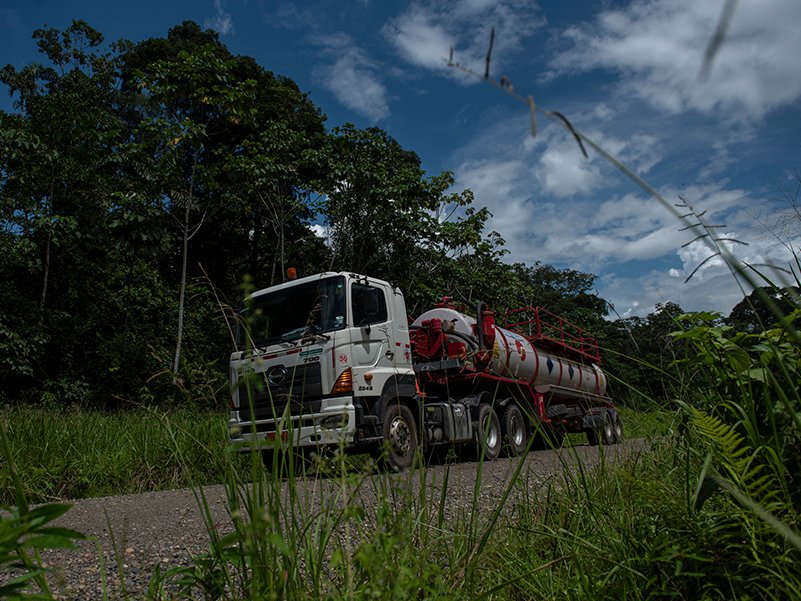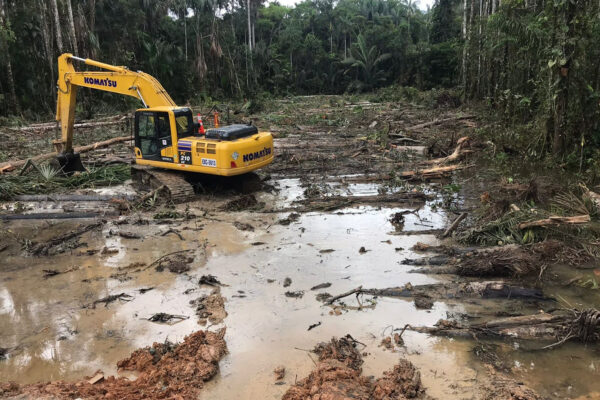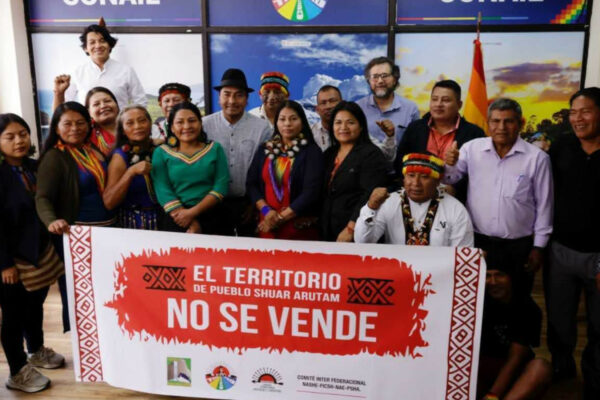During his first 100 days in office, Ecuador’s new president, Guillermo Lasso, made it clear that his government’s economic policy will be based on extractivism. According to the new administration, natural resources, such as oil, gas, and minerals, found in Ecuadorian subsoil are “essential,” given the economic situation he inherited due to poor management by his predecessors, the impacts of the COVID-19 pandemic, and the related oil price collapse. Extractivism has yet to become the golden egg Ecuador’s past presidents expected. Lasso’s plan to double down on it as Ecuador’s only option for economic recovery is a dangerous gambit, considering its dependence on commodities is a major reason for its current economic crisis. It was not that long ago that oil was valued at negative $37 a barrel.
Regardless, President Lasso signed Executive Decrees 95 and 151 on July 7 and August 5 of 2021, respectively. They both propose a radical transformation of oil, gas, and mining policies through the implementation of two immediate action plans for the development and modernization of this sector in Ecuador. The first focuses on the deregulation of operational processes in the oil and gas industry, aimed at doubling the country’s oil production. The second seeks to increase mining exports and make Ecuador more appealing to foreign investors.
The Confederation of Indigenous Nationalities of Ecuador (CONAIE), the Confederation of Indigenous Nationalities of the Ecuadorian Amazon (CONFENIAE), and their grassroots organizations rejected both decrees outright. They forewarned government officials that any attempt to regulate state obligations regarding the right to prior consultation and consent must be done with the consultation and consent of Indigenous peoples.
On the ground organizing, legal challenges, and resistance combined with international advocacy strategies led by Amazon Watch have effectively derailed government plans to expand extraction into the rainforest before. And now, as the Amazon biome faces a dangerous ecological tipping point, we are using finance and market strategies to bolster the in-country efforts of our Indigenous allies. This pressure compels the government to take steps to respect Indigneous collective rights, the rights of nature, and keep fossil fuels and minerals like gold and copper permanently in the ground.
The government’s public policy strategy is nothing new, and it continues to exploit nature. However, it is concerning that this new administration is clearly serving the interest of transnational capital and business ventures seeking to expand the extractive industry into new, remote rainforest and Indigenous territory.
Both decrees were carefully written to cover their technical, operational, and legal bases and avoid regulatory scrutiny and constitutional protections. Beginning with the change from a service contract model to a participation model where the Ecuadorian government assumes the financial risk of extractive projects.
The oil contract model in Ecuador has been subject to change over the years, often at the whim of the sitting administration. In 2010, companies had a profit margin of 80/20. In order to change these conditions and achieve more government control of resources, it was declared that the distribution of extraction profits had to be at least 50/50, which took away windfall profits and equalized the participation of the government. But the new decree returns the percentage to favor industry and court new investment.
The decrees reiterate the narrative of establishing clear, strict rules for environmental protection and the development of communities in the affected areas, but they require strong enforcement. The purpose and implementation of the decrees however, demonstrate setbacks in the guarantee of human and collective rights and the rights of nature. For example, the Ministry of Energy and Non-Renewable Resources and the Ministry of Environment, Water, and Ecological Transition are expected to facilitate procedure approvals and eliminate administrative roadblocks for both oil and mining industries. This means that they will prepare a fast track mechanism for environmental licenses, ignoring the constitutional guarantees and democratic principles of the rule of law.
In other countries in the region, such as Chile, Peru, and Colombia, this phenomenon has already occurred. The so-called “socio-environmental fast track has resulted in the bending of rules and impunity for corporate crimes and abuses.
At the same time, the government announced new bids for the Intercampo oil round in the northern Amazon, and bids for offshore blocks are pending, which are located in the low-lying coastal region in the province of Guayas. Also on the table is the Ronda Suroiente – the oil auction round for 12 oil blocks in the country’s southeastern remote Amazon, plagued with issues concerning lack of prior consultation and consent, and strong community opposition. The decree aims to double oil production to 1 million barrels per day, opening up these areas in search of new reserves–that the world can’t afford to burn according to the recent EIA and IPCC reports. The oil industry is also a major driver of deforestation, felling standing forests critical for climate change stability.
These decisions threaten the commitments made by the government in the Paris Agreement as well as the goal of substantially and rapidly reducing the use of fossil fuels. It is therefore inconceivable that the government would promote this new policy when the experts on the Intergovernmental Panel on Climate Change declared that it is a priority to halt fossil fuel production as well as decrease deforestation drivers and sources of contamination, such as mining, in order to address the climate crisis.
Another scandalous aspect of this decision is the change of dispute settlement mechanisms between investors and the government. According to the new extraction policy, conflicts between the parties will be resolved in international arbitration courts, which have historically sided with businesses and have filed million-dollar lawsuits that have been harmful to the government and Ecuadorian society. One clear example is the Chevron arbitration award and the trial for the liquidation of the contract of the Occidental Exploration and Production Company (OXY). Therefore, a return to this type of conflict resolution will hinder access to justice for the communities affected by exploitation.
The decree also opens the operation of production fields held by the state-owned company Petroecuador to the private sector in hopes of reactivating and increasing production. Why is this a bad thing? It is true that Petroecuador is in the middle of a structural crisis, but moving operations to the private sector means that the affected communities will face more obstacles in demanding that the government fulfill its obligations, while corporations will be protected by this new type of contract and the new dispute settlement system.
Under this framework, all Petroecuador service stations will also be sold. At first, the sale of these services and facilities will generate profit for the government, providing the illusion of economic stability so that people believe that this is the correct decision. However, in the long term, this decision will limit sources of fiscal income and sustainability. Thus, if in the medium-term, the government does not have the necessary income to support its fiscal management, social policies and the guarantee of fundamental public resources such as health and education, among others, will suffer.
Likewise, there is talk of implementing a system for complaints, transparency, and access to information guided by the decrees. These strategies already exist in other countries, but experience has shown them to be administrative schemes that seek to manipulate participation. In this context, it should be noted that the national government is required to implement the Escazú Agreement. Therefore, it must implement those mechanisms, and it is also obligated to recognize the work of those who are defending nature. However, both the Agreement and these standards are absent from the decrees.
Regarding the mining sector, it was announced that a prevention strategy would be implemented to “combat illegal mining extraction.” This means that territorial occupation or intervention operations will be conducted where there is illegal mining activity through the coordination and co-operation of various government institutions responsible for mining control and public safety. In other words, Decree 151 anticipates military occupation of Indigenous territories, and ignores the rights violations brought on by legal mining activity.
This is just the beginning. This has been made clear by the slow rollout of measures mentioned in the decrees and the ambiguity of several actions planned for the short and medium-term. The strategy is to gradually issue lower-level legal instruments in order to reduce the government’s responsibility, and sources of fiscal income. Then the administration aims to prevent the implementation of territorial government processes that ensure the fulfillment of the it’s obligation to guarantee human and collective rights and the rights of nature.
These decrees are a threat to the Amazon, its peoples, and the climate. They pave the way for a massive expansion of extraction in some of the most ecologically fragile and culturally sensitive areas, and if history is any lesson, promise continued rights violations of Indigenous peoples and nature. We must stand with them in defense of their territories, their rights, and the Amazon that we all depend on.














